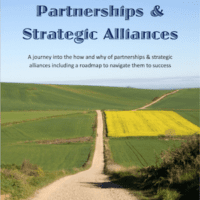A few weeks ago I asked the readers of my newsletter the question “What is a strategic alliance?”. I must say, I received an interesting set of answers back. Not surprisingly the answers are pretty much in line.
To summarize, the key words of the definitions of strategic alliance you gave were:
- Two organizations, long-term, increased revenue
- Value creating, positive, success
- CEO support
- (Formal) agreement, trust
- Together we are stronger, “1+1>2”
When you combine these collective keywords into one definition you will come close to the formal definitions as I see them often used among my customers. Here is a collection of the definitions I received in response to my question.
Definitions of strategic alliance
- A “partnership” between two organizations where both parties are able to derive value from the engagement (vs a relationship – where only 1 party sees value). You would start a strategic alliance when you are unable to achieve results on your own. Or when the strategic alliance will dramatically improve the time to results.
- A strategic alliance is a positive relationship between two companies that increase revenue, industry reach, and internal knowledge.
- A long-term value-creating relationship.
- What is strategic? This is a much-overused word by those trying to imply importance. In my view strategy is about the allocation of the scarce resource to achieve the corporate mission and therefore the little word “or” is important: build or buy or partner, direct sales or channel or alliance, etc. These decisions include calculation of opportunity cost by the finance or strategy director. Crucially strategic implies approval and regular review by the CEO or direct report. Alliance decisions lower down are tactical and often fail because of lack of CEO support, no matter how well they are aligned to (assumed) strategy.
- A collaborative relationship which leads to success for both parties.
- An opportunity for each member of the relationship to achieve their goals, but assisting the other party to achieve theirs.
- A ‘together we are stronger’ relationship.
- A strategic alliance is a (formal) agreement based on mutual trust to cooperate intensively in order to achieve a goal that partners cannot achieve (easily) independently.
- A strategic alliance means creating value beyond what an individual company can do. The equation is “1+1>2“.
My definition of strategic alliance
This is the definition we use in the Alliance Masterclass:
A strategic alliance is a strategic cooperation between two or more organizations, with the aim to achieve a result one of the parties cannot achieve alone.
When discussing the definition I always emphasize the italic items. These are the ones that highlight the core of a strategic alliance. At the end of the day, it is not about which definition is right and which one is not.
It is highly recommendable to be very clear about what for you and your company a strategic alliance or partnership is: the alliance spectrum is a broad spectrum covering many types of partnerships.
When you are working in a large organization, a different type of partnership will occur in your organization. Creating an internal definition of what an alliance or partnership is, will help to clarify which partnership efforts your alliance department will actively support and which efforts will fall out of that scope.
Also in working with your partner, it is important to be clear on the definition of terms used. Miscommunication or assumptions about what is being meant are often the cause of failing alliance attempts.
After all: clarity precedes mastery!
What is a strategic alliance?
Read more in my ebook “Successful Partnerships & Strategic Alliances“

[…] means different things to different people. Looking at their press releases they all fit within the definition of an alliance, except potentially the partnership between FGE and Starwood where the real collaboration aspect is […]
[…] though the conference hotel also appeared to be a casino, the only correlation between alliances and gambling is that most people who gamble with their alliances will end up with failing […]